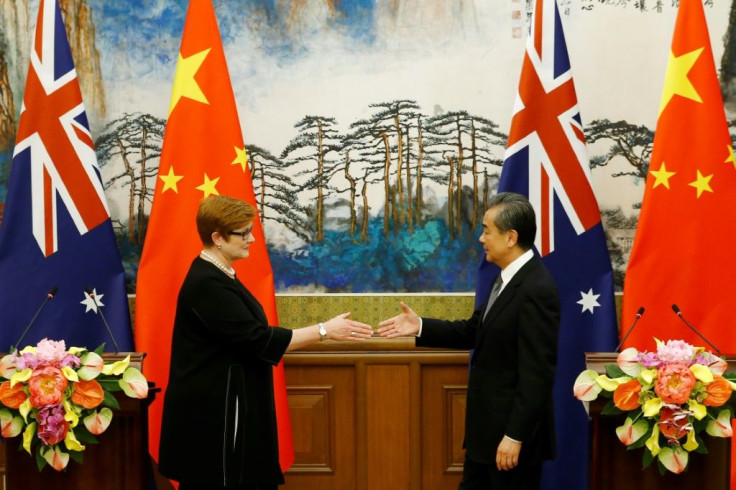Australia-China Tensions: Foreign Minister Blasts Beijing For Coronavirus 'Disinformation'
KEY POINTS
- Australia’s foreign minister, Marise Payne, gave a major foreign policy speech that outlined the value of multilateral institutions like the WHO
- She said about Russia and China, “For our part, it is troubling that some countries are using the pandemic to undermine liberal democracy to promote their own more authoritarian models”
- Payne also commented on the racial attacks against Chinese students, saying, “I can say emphatically that Australia will welcome students and visitors from all over the world, regardless of race, gender, or nationality”
Australia’s foreign minister, Marise Payne, gave a major foreign policy speech Tuesday that outlined the value of multilateral institutions like the World Health Organization (WHO) but also highlighted some charges made by the European Commission that Beijing and Russia are spreading propaganda about a rise in racial attacks during the COVID-19 pandemic.
There are several areas of dispute that are escalating tensions between China and Australia:
- Australia was included in the list of countries on the receiving end of Beijing’s “targeted influence operations and disinformation campaigns” about COVID-19, presumably for political reasons. Russia was also involved in leading the campaigns, according to Payne
- Two targeted groups were the Australian tourist industry and the many Chinese students who attend Australia’s universities. Beijing issued warnings to tourists and students to avoid Australia due to an uptick in racist attacks linked to fears about the coronavirus
- China has in recent weeks introduced restrictions on Australian imports of beef and barley that is likely retaliation for Canberra’s push for an inquiry into China’s handling of the coronavirus pandemic
- The U.S., Australia, and others share concerns over the degree of influence that China has over the WHO
- A Chinese court on Saturday sentenced Karm Gilespie, an Australian, to death for drug trafficking. Both countries are being coy as to if the case is related to Beijing’s other actions
Payne delivered her speech at an event at the National Security College at Australian National University in Canberra. She said, “For our part, it is troubling that some countries are using the pandemic to undermine liberal democracy to promote their own more authoritarian models. The disinformation we have seen contributes to a climate of fear and division when at a time like this what we need is cooperation and understanding.”
She commented on the racial attacks against Chinese students, saying, “I can say emphatically that Australia will welcome students and visitors from all over the world, regardless of race, gender, or nationality. Our law enforcement agencies can, will, do respond to individual crimes and we will continue to move beyond this pandemic true to our status as the world’s most successful multicultural society. The prime minister and the government have repeatedly called out racist behavior.”
The country down under, as Australia is often called, is an ally of the U.S., but its largest trade partner is China. Before the pandemic, Chinese tourism added A$12 billion (US$8.3 billion) annually into the Australia economy with another large chunk from Chinese students contributing to its A$38 billion international education industry.
Any probe into China’s handling of the coronavirus will include the WHO. Payne acknowledged concerns that it was excessively influenced by Beijing.
She said, “In the wake of this devastating health crisis, Australia wants to see a stronger WHO that is more independent and transparent. We cannot let the vital and practical work that the WHO does on the ground be overshadowed by questions about the approach of its headquarters in Geneva.”

© Copyright IBTimes 2024. All rights reserved.





















